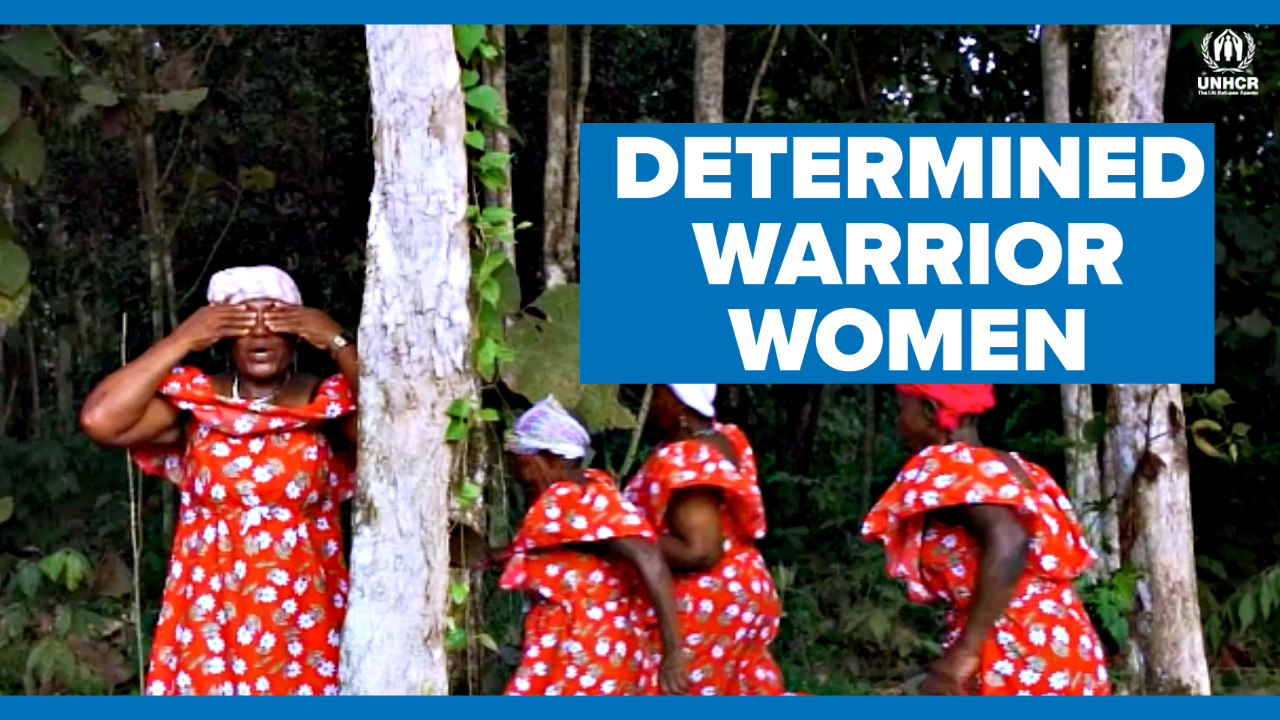Q&A: Sisters in a "Sweet Rush" to make music and help Somalis
Q&A: Sisters in a "Sweet Rush" to make music and help Somalis

GENEVA, November 2 (UNHCR) - Born in Mogadishu, Siham and Iman Hashi are the first female Somali artists to sign a record deal with a major American label. After the civil war broke out in Somalia in the 1990s, the girls and their family moved to Canada as refugees. They are currently in Los Angeles recording their first album as "Sweet Rush" with Universal Motown, while finding time to raise awareness about the continuing suffering in their homeland. The sisters discussed their lives and work recently with UNHCR Web Editor Leo Dobbs in Geneva, where they performed at the Nansen Refugee Award ceremony. Excerpts from the interview:
Tell us about your departure from Somalia
Siham: We were born in Somalia but we don't have many memories of it. Our mother was a Somali diplomat and we moved to Saudi Arabia. We stayed there for a year or two and then moved to Germany. When the civil war broke out [in 1991] we were resettled in Canada. When we came to Toronto [with their parents, two sisters and a brother], we had to learn English. We noticed that [in Toronto] we weren't really getting the things that we asked for anymore. Our parents tried their best. They sheltered us a lot and they never made us feel like we had nothing, even though we had to start all over again.
Toronto's a pretty cosmopolitan city. Did you ever face problems there?
Iman: We realised we were different when we were in middle school. I think before middle school, we just thought, "Okay, we're kids." Many people said things that went over our heads. But at middle school I realised, kids were going to ask, "Like, where are you from?" "I'm from Somalia." "You're from Somalia? That's where all the starving people are and the kids with the big stomachs and the orphans." I was like, "What! No. Somalia is beautiful, it's just going through stuff."
It was so hard. Kids are mean in middle school. That's when I realised that people thought, "Oh, so you're a refugee." And I was like, "How do you know that I'm not a refugee?" And then I heard my Mum say that we are. That's when I realised that we were different.
Where did the music come from?
Imam: We grew up in a very traditional and religious [Muslim] home. My Dad was very strict and he was worried about education and never encouraged music. But my Mum was more lenient and would let us play Whitney Houston and other popular music when we were younger, and we would sing. And she would say, "You girls can sing." The interesting thing is that my parents can sing too, but nobody really encouraged it in the house. So it was just us singing together all the time and at school and with our friends. We never took singing lessons. Training was all school based, like vocal class and the school play.
How did you make the next step?
Imam: We moved to Atlanta. It was a very difficult thing getting to Atlanta because our parents would say, "No, we want you to go to college and become doctors. That's why we brought you to this country. This is your opportunity to do great things." We were like, "We love school, school's always going to be there, but can we just pursue our passion." It was like a battle, back and forth.
But finally my Dad said okay and we moved to Atlanta because my Dad's sister lived there and he said, "I trust her, so you guys live with her." That's the only reason we were allowed to go there. We were just meeting people and recording in studios. It was really difficult. But then when we landed the record deal, it was like: "Oh, my gosh." Back home, my parents got a lot of [strife]. People aren't very happy about their decision to let us go because in the Somali culture and religion it's taboo.
So everybody was mad at my parents. The Somali community is very tightknit. Our parents didn't care and said, "We trust our daughters and this is what they want to do and we have to respect that." So we got the record deal and . . . people back home thought, "They're actually doing this." Now we're starting to work with these amazing producers and a lot of great things are happening.
Do you sing about refugees?
Imam: Yes, we have the song that we performed at the Nansen Awards, "Shelter." It does not talk specifically about shelter and refugees. But it was meant to be vague, so that anybody listening to it can feel like it's talking to them. Listen to the song - it can be talking about refugees.
And then, "Take me Home," of course. We wanted to write a song about Somalia, but we didn't want to leave anybody out. So anybody from any country can feel like, "Oh man, I can go back to my country." But in our hearts we wrote about Somalia.
Have you been back to visit Somalia?
Imam: No, but we talk about it all the time. I know there are other parts of Somalia that are a little more settled and actually doing well. We were born in Mogadishu and I don't know when we can ever go back there, but that's a dream we have. We still have an aunt in Mogadishu. They always call us by mobile phone and we send money to them.
What about Dadaab camp for Somali refugees in Kenya?
Siham: No, but we want to plan a trip there very soon. Our great uncle and his seven children are there and we didn't even know until two years ago that they were there. It's not something that anybody ever talked about. We were shocked when we heard. It was like, "We're living this great life and we still have family in refugee camps?" It just didn't make sense to me.
When did your humanitarianism begin?
Imam: We recently started a non-profit organization. We've been talking about it for the past three years. Any time we had an interview, people would ask: "What are you passionate about?" We'd say we want to help our country, but for a long time we didn't know how, because now when people think about Somalia they think about pirates and religious warfare. It's always so negative. It's like, why would you want to get into that mess and all the politics. But I feel that it's up to our generation to do something. So we set up an organization called "Somalia Lives Again," obviously for the hope that there would be a better Somalia one day. We started to do research on Somalia refugees and the world's largest refugee camp [Dadaab]. We started doing little benefit concerts to spread awareness because it's hard sometimes to raise funds.
It was interesting to find out that people didn't know what the UNHCR was, didn't even know about these camps [in Dadaab and elsewhere in the world]. So we started targeting communities with a lot of Somali people. It was heartbreaking to know that Somali people didn't know there were Somali refugees in these camps. We're using our music and our voice and the name we've made for ourself, "Sweet Rush," to spread awareness.
How did it feel to sing at the Nansen Award ceremony?
Siham: It was so amazing; we're just so appreciative and we were so excited that we were even invited to perform. And just being up on that stage and singing songs about our country, and people being so receptive to it. It was an amazing feeling.
Do you think you can make a difference?
Siham: I feel we can make a big difference. Even us taking a step forward and pursuing our passions has really made a difference to young Somali girls, young Somali kids in general. Before, they didn't think they could go out of this little box that was created for them and now that we've stepped out of that box, they're thinking, "Maybe I can pursue my passion." It doesn't even have to be music, it could be anything, maybe things they hadn't thought of before. So, I feel that we made a big difference.
Imam: Also we feel that music is a universal language. Music touches everybody.
What are your plans for the future?
Imam: We're working on an amazing album right now. We want to fuse Somali music and maybe make it a little bit more modern. We like to call it tribal pop. Our plan is to finish this album and then go on a world tour and continue with this journey.








